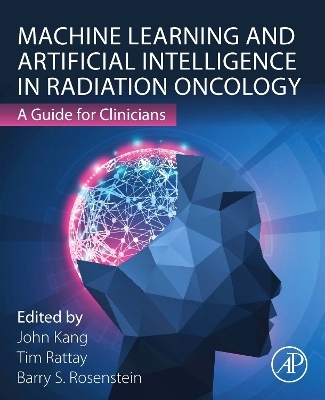
Machine Learning and Artificial Intelligence in Radiation Oncology
Academic Press Inc (Verlag)
978-0-12-822000-9 (ISBN)
This book is divided into three sections: the first addresses fundamental concepts of machine learning and radiation oncology, detailing techniques applied in genomics; the second section discusses translational opportunities, such as in radiogenomics and autosegmentation; and the final section encompasses current clinical applications in clinical decision making, how to integrate AI into workflow, use cases, and cross-collaborations with industry. The book is a valuable resource for oncologists, radiologists and several members of biomedical field who need to learn more about machine learning as a support for radiation oncology.
Dr. Rosenstein is a Professor of Radiation Oncology and a Professor of Genetics & Genomic Sciences at the Icahn School of Medicine at Mount Sinai. The focus of Dr. Rosenstein’s research program for the past 25 years has been the identification of genetic/genomic markers associated with the development of adverse effects resulting from radiotherapy. In this context, he was one of the first investigators to hypothesize that possession of single nucleotide polymorphisms in certain genes may render some cancer patients more susceptible to injuries resulting from radiotherapy. Dr. Rosenstein established and co-led for 14 years the Radiogenomics Consortium (RGC), representing an international consortium currently with 240 members in 33 countries across 135 institutions. Through his efforts, Dr. Rosenstein, has been in the forefront of research in the use of big data in radiation oncology and has collaborated with investigators possessing expertise in bioinformatics and statistics to employ machine learning-based modeling approaches in radiogenomic studies. Dr. Rattay is Associate Professor in Breast Surgery at the University of Leicester and Consultant Breast Surgeon at University Hospitals of Leicester, UK. He has been working in the field of radiobiology and radiogenomics of the normal tissues for over ten years. His research is specifically focused on the effect of breast radiotherapy on surgical and patient-reported outcomes. This includes Big Data and machine learning (ML) approaches and he is also interested in applying qualitative research methodology to explore breast cancer survivors’ views and experience of treatment and personalised medicine. Dr. Rattay works in a multi-disciplinary research team with nurses, clinical psychologists, geneticists, radiographers and medical physicists, and he has established collaborations with ML experts both nationally and internationally. Dr. Kang has over 15 years of experience in developing and applying novel computational methods to complex, biomedical data. He is an assistant professor and biomedical informatics lead in the Dept. of Radiation Oncology at the University of Washington. His research focus is on machine learning in oncology with a specific focus on natural language processing and topic modeling and his operations focus is on using informatics to improve patient care and decrease physician burden. Dr. Kang has been invited to speak on AI in oncology at several national and international conferences and workshops.
Section 1: FUNDAMENTAL CONCEPTS 1. Overview of machine learning and radiation oncology 2. Machine Learning techniques in genomics (shallow learning) 3. Bayesian machine learning/deep learning 4. Computational Genomics Section 2: TRANSLATIONAL OPPORTUNITIES 5. Germline Radiogenomics 6. Tumor Radiogenomics: PORTOS, GARD/RSI, Bayesian Networks 7. Quantitative imaging with genomics for radiation oncology 8. Autosegmentation Section 3: CURRENT CLINICAL APPLICATIONS 9. Integrating ML into clinical decision making 10. Machine learning classification algorithms for outcome prediction in radiotherapy 11. Clinical integration of AI into workflow 12. Standardization/Use Cases/Data Sharing/Privacy 13. Cross-collaborations with Industry
| Erscheinungsdatum | 12.12.2023 |
|---|---|
| Verlagsort | San Diego |
| Sprache | englisch |
| Maße | 191 x 235 mm |
| Gewicht | 450 g |
| Themenwelt | Informatik ► Theorie / Studium ► Künstliche Intelligenz / Robotik |
| Medizin / Pharmazie ► Medizinische Fachgebiete ► Onkologie | |
| Naturwissenschaften ► Biologie | |
| ISBN-10 | 0-12-822000-7 / 0128220007 |
| ISBN-13 | 978-0-12-822000-9 / 9780128220009 |
| Zustand | Neuware |
| Haben Sie eine Frage zum Produkt? |
aus dem Bereich


